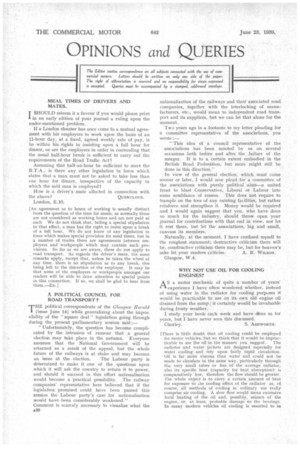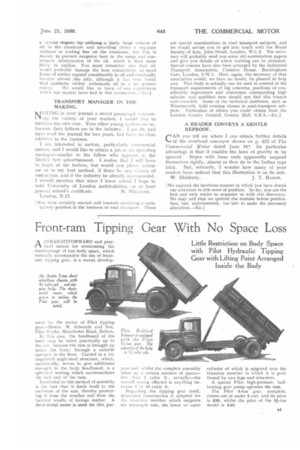OPINIONS and QUERIES The Editor invites correspondence on all subjects
Page 34

Page 35

If you've noticed an error in this article please click here to report it so we can fix it.
connected with the use of com mercial motors. Letters should be written on only one side of the paper. The right of abbreviation is reserved and no responsibility for views expressed
is accepted. Queries must be accompanied by a stamped, addressed envelope.
MEAL TIMES OF DRIVERS AND MATES.
SHOULD esteem it a favour if you would please print I. in an early edition of your journal a ruling upon the under-mentioned problem.
li a London shunter has once come to a mutual agreement with his employers to work upon the basis of an 11-hour day, at a fixed, agreed weekly rate of pay, is he within his. rights in insisting upon a full hour for dinner, or are the employers in order in contending that the usual half-hour break is sufficient to carry out the requirements of the Road Traffic Act?
Assuming that half-an-hour be sufficient to meet the R.T.A., is there any other legislation in force which states that a man must not be asked to take less than one hour for dinner, irrespective of the capacity in which the said man is employed?
How is a driver's mate affected in connection with
the above? QUERULOUS. London, E.10.
[An agreement as to hours of working is usually distinct from the question of the time for meals, as normally these are not considered as working hours and are not paid as such We do not think that, failing a special stipulation to that effect, a man has the right to insist upon a break of a full hour. We do not know of any legislation in force which makes special provision for meal times, but in a number of trades there are agreements between employers and workpeople which may contain such provisions. So far as we are aware, these do not apply to road transport. As regards the driver's mate, the same
remarks apply, except that, unless he takes the wheel at • any time, there is no stipulation as to any break, this being left to the discretion of the employer. It may be that some of the employers or workpeople amongst our readers will be able to draw attention to special points in this connection. If so, we shall be glad to hear from them.—En.] A POLITICAL COUNCIL FOR ROAD TRANSPORT?
mHE political correspondents of the Glasgow Herald (issue June 14) while generalizing about the impossibility of the " square deal" legislation going through during the, present parliamentary session said :— " Unfortunately, the question has become complicated by the intrusion of rumour that a general election may take place in the autumn. Everyone assumes that the National Government will be returned as a result of the appeal, but the whole future of the railways is at stake and may become
an issue at the election. The Labour party is determined to make it one of the questions upon which it will ask the country to return it to power, and should it succeed in this effort nationalisation would become a practical possibility. The railway companies' representative here believed that if the legislation promised could have been passed this session the Labour party's case for nationalisation would have been considerably weakened."
Comment is scarcely necessary to visualize what the A32 nationalization of the railways and their associated road companies, together with the interlocking of manufacturers, etc., would mean to independent road transport and its suppliers, but we can let that alone for the moment.
Two years ago in a footnote to my letter pleading for a committee representative of the associations, you wrote :— " This idea of a council representative of the associations has been mooted by us on several occasions both before and after the failure of the merger. It is to a certain extent embodied in the British Road Federation, but more might still be done in this direction."
In view of the general election, which must come sooner or later, I would now plead for a committee of the associations with purely political aims—a united front to blast Conservative, Liberal or Labour into some semblance of reason. This does not require to trample on the toes of any existing facilities, but rather reinforce and strengthen it. Money would be required and I would again suggest that you, who have done so much for the industry, should throw open your journal for contributions with that end in view, nor let it rest there, but let the associations, big and small, canvass its members.
Naturally, at the moment, I have confined myself to the roughest statement; destructive criticism there will be, constructive criticism there may be, but for heaven's sake let your readers criticize. A. R. WILSON. Glasgow, W.4.
WHY NOT USE OIL FOR COOLING ENGINES?
AS a motor mechanic of quite a number of years' experience I have often wondered whether, instead of using water in the radiator for cooling purposes it would be practicable to use on its own old engine oil drained from the sump; it certainly would be invaluable during frosty weather.
I study your book each week and have done so for years, but I have never seen this discussed.
Chorley. S. ASHWORTH.
[There is little doubt that oil cooling could he employed for motor vehicles, hut we think that it would he imprac ticable to use the oil in the manner you suggest. The radiator and water jackets are designed especially for water cooling and rely upon fairly rapid circulation. Oil is far more viscous than water and could not be made to circulate in the same way, particularly through the very small tubes or fins of the average radiator, also its specific heat (capacity for heat absorption) is comparatively low, therefore the flow should be greater. The whole object is to carry a certain amount of heat for exposure to he cooling effect of the radiator as, of course, all methods of cooling in ordinary use really comprise air cooling. A slow Row would mean excessive local heating of the oil and, possibly, seizure of the engine, or. at least, probable damage to the bearings. In many modern vehicles oil cooling is resorted to in a certain .dregrneo,layutilizingaa fairly large volurae of oil in the crankcase and Orovidine either a separate radiator or cooling fins on the crankcase, but this is mainly to prevent excessive heat in the sump and consequent deterioration of the oil, which is then more likely to oxidize. You must remember also that oil would probably damage the hose connections, as most forms of rubber expand considerably in oil and eventually become almost like jelly, although it bas keen found that synthetic rubber withstands oil to a car renter extent. We would like to learn of one c,perienees which our readers have had in this connection.—E1)..1
TRANSPORT MANAGER IN THE MAKING.
M °TING in your journal a recent paragraph concern' ing the variety of your readers, I would like to mention my own case. Your other young readers are so, because their fathers are in the industry. I am 16, and have read the journal for two years, but have no close relatives in the business.
am interested in motors, particularly commercial motors, and I would like to obtain a job mi an operating manager—similar to the fellow who appears in the Henley tyre advertisement. I realize that I will have to begin at the bottom, but would you please advise me as to my best method, if there be ally classes of instruction, and if the industry be already overcrowded. I should mention that when I leave school I hope to hold 'University of London matriculation, or at least
general school's certificate. K. HILLIGER, London, N.17. .
[Yoa have certainly started well towards obtaining a satisfactory position in the business of road transport. There are special examinations in road transport subjects, and we would advise you to get into touch with the Royal Society of Arts, John.Street, London, W.C.2. The secretary will probably send you sonic old examination papers and give you details of where training can be obtained. Special courses have also been arranged by the Industrial Transport Association, Chandos House, Buckingham Gate, London, S.W.1. Here, again, the secretary of that association would, we have no doubt, be pleased to help you. That body is actually one for men in control, of the transport requirements of big concerns, positions of considerable importance and sometimes commanding high salaries, and qualified men should not find this branch over-crowded. Some of the technical institutes, such as Wandsworth, hold evening cleeses in road-transport subjects. Particulars of others you could obtain from the London County Council, County Hall, S.E.1.—E.]
A READER CONVEYS A GENTLE REPROOF.
r AN you tell me where I can obtain further details 14—, of the overhead conveyor shown on p. 615 of The Commercial Motor dated June 16? Its particular advantage is that it enables the laws of gravity to be ignored. Ropes with loose ends apparently suspend themselves rigidly, almost as they do in the Indian rope trick. But, seriously, I wonder how many of your readers have noticed that this illustration is on its side.
W. Didsbury. J. T. MASON.
[We enjoyed the facetious manner in which you have drawn our attention to this error of position. So far, you are the first and only reader to acquaint us with this discovery. We may add that we spotted the mistake before publication, but, unfortunately, too late to make the necessary alteration.—ED.]












































































